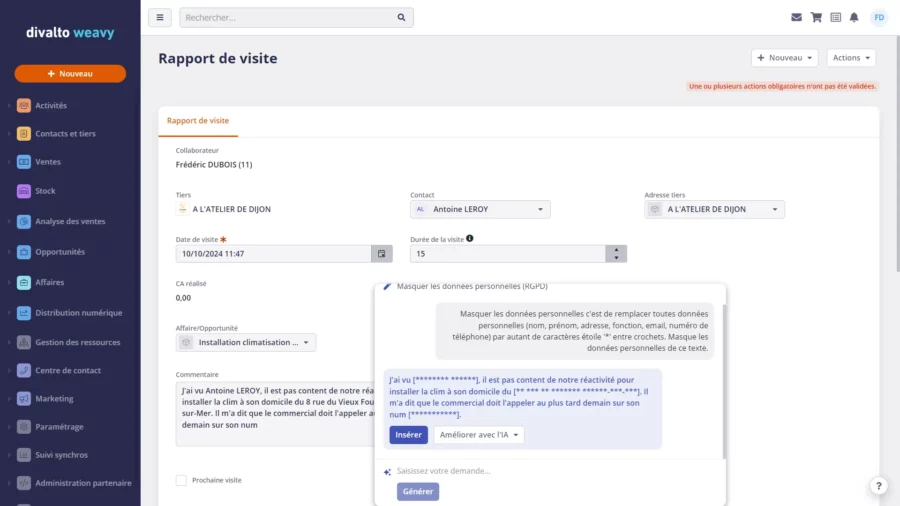What is generative AI, and how can it improve your business?
Divalto integrates this technology to simplify operations, support smarter decisions, and strengthen customer relationships. It’s a new lever for growth and competitiveness.
As part of our ongoing innovation strategy to meet evolving user needs, we are enhancing our solutions by integrating generative AI to deliver even greater performance.
This new step forward aims to enrich the user experience across our platforms through the power of AI.
In this article, we present the first three generative AI features that will soon be available across our entire product line.
Artificial intelligence is evolving at a faster rate than any other digital technology. It improves access to information, automates repetitive tasks, and increases operational efficiency.
AI also supports better decision-making by analyzing large amounts of data and delivering valuable insights for informed business strategy.
With the launch of new generative AI functionalities based on Microsoft Azure OpenAI Service, which gives access to powerful models such as GPT and o1, we are continuing our approach of constant innovation. The aim of this investment is to add natural language text understanding and generation capabilities. These new features will enable users of our Divalto business, Divalto field service, Divalto industry and Divalto weavy solutions to save time on low value-added tasks, by manipulating and/or exploiting business data more rapidly.
Generative AI can create, rewrite, or adjust text from simple prompts. It is widely used and easy for anyone to adopt.
Soon, this feature will be available in all long-text and rich-text fields in our products. More improvements will follow to boost its performance.
Examples of use cases :
Objective: automate text creation and manipulation to improve user productivity and accuracy.
This artificial intelligence functionality will be integrated into the next ERP SaaS and CRM versions, due for release in November 2024.
Initially, it will be made available as a Beta version to partners, before being offered to all users of the Divalto one platform during 2025.
We will also allow users to create business-specific prompts for each functional module. For example: summarizing an opportunity, checking deal progress, identifying blockers, or drafting messages for quotes and contacts.
This customization will be available in 2025 through simple no-code settings, and with a new development kit to extend AI contexts.
We are developing a “Chat/Copilot”-style assistant to interact with our ERP and CRM in natural language. It will understand user requests, suggest next steps, and execute actions such as creating quotes, scheduling reminders, or triggering orders.
Our goal is to deliver AI features designed for business use, with strong personalization to ensure they are truly useful.
This assistant will be available to all Divalto one ERP and CRM users by the end of 2025. We are also creating AI tools for our developer partners.
“By integrating AI, companies can reap tangible benefits with measurable ROI. Thanks to its ability to automate certain tasks and streamline operations, they gain in efficiency and productivity. According to a recent study on the productivity of generative AI , 45% of executives estimate that their employees’ productivity has doubled thanks to GenAI alone. Today, we’re going one step further: we’re putting AI at the heart of small and medium-sized businesses’ information systems. The use cases we propose are directly linked to the needs expressed in the field by our users. So, in addition to generative AI to help generate and rework textual elements, we are developing business-specific prompts for our business solutions dedicated to industry, maintenance and so on. We offer, among other things, the possibility of summarizing a business opportunity, indicating the progress of a deal or identifying obstacles. The Copilot-type assistant we’re working on will enable us to create a quotation, or trigger a replenishment order – recurring needs within the businesses we address. At the same time, thanks to their expertise in our solutions and their knowledge of our customers, our partners will be able to develop new use cases on their own.” Jérémy Grégoire, Chief Executive Officer.
1
Generative AI is transforming ERP and CRM by automating tasks, improving customer experience, and personalizing interactions. By analyzing large volumes of data, AI predicts customer needs and supports smarter marketing and sales decisions.
AI-powered tools also strengthen customer service through automated responses and intelligent chatbots, reducing workload while maintaining responsiveness.
With forecasting, trend detection, and real-time adaptation, businesses become more agile and proactive. Integrating AI into ERP and CRM systems is now a key driver of digital transformation — improving efficiency, engagement, and customer satisfaction.
2
Generative AI and CRM Automation: A Game-Changer in Task Management
CRM automation is now essential to streamline processes and increase efficiency. Generative AI accelerates this shift by automating repetitive actions inside CRM systems.
Generative AI manages tasks such as data entry, customer record updates, and report creation. Teams can then focus on higher-value work like strategy and customer engagement.
AI analyzes customer behavior and anticipates needs. It can identify purchasing patterns and suggest targeted campaigns — supporting stronger loyalty and higher conversion.
Automation limits mistakes linked to manual input. More accurate data improves decision-making and ensures consistency across the CRM.
AI-powered chatbots provide instant responses 24/7. They deliver relevant information and help improve satisfaction and brand loyalty.
Modern CRM automation tools connect easily to ERP and other business platforms — enabling companies to adopt generative AI without replacing their existing systems.
3
Generative AI improves data management but brings several risks that organizations must anticipate.
Data Quality
If the data used to train models is biased or incomplete, the outputs will be too — leading to unreliable insights and decisions.
Security and Privacy
AI requires access to large datasets, sometimes containing sensitive information. Inadequate protection exposes companies to cyberattacks, leaks, and non-compliance with regulations such as Québec’s Law 25.
Data Manipulation
Generative AI can produce false or misleading content (ex: deepfakes). Used unintentionally, it can harm brand credibility and customer trust.
Technology Dependence
Relying too heavily on AI may weaken human expertise. Without critical analysis of AI-generated outputs, errors can escalate and impact operations.
Ethics and Transparency
AI models often function as “black boxes,” making decisions hard to explain or justify. Organizations must ensure traceability, accountability, and responsible use.
4
To measure ROI, define concrete goals such as improving sales efficiency, reducing costs, or increasing customer satisfaction. They must align with your strategic priorities.
Include all expenses related to:
Track measurable gains such as:
Consider the qualitative impact on:
Use the formula:
ROI = (Net Benefit / Investment Cost) × 100
Net Benefit = total gains − implementation costs.
Review performance regularly and refine your strategy to ensure lasting value and alignment with business goals.


